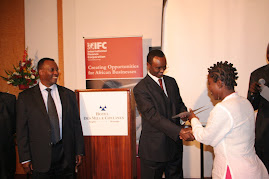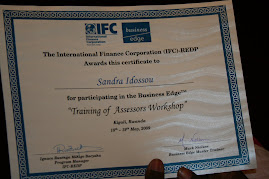
http://newtimes.co.rw/index.php?issue=13850&article=1533&week=14
CUSTOMER CARE: Emulating Gandhi, as a Customer Service Guru
Sandra Idossou
Today as a lot is being said about customer service in Rwanda and with the Indian investors in the country at the moment, I would like to share with you this quote that has been attributed to Mahatma Gandhi which I first read about 9 years ago.
Because of this quote I have always been amazed how in 1890 Gandhi could so very well have understood the importance of customers.
Though Gandhi never worked in retail or owned a store, he truly believed that serving customers is the reason for any enterprise. I wish all shop owners will print this boldly for their staff.
“A customer is the most important visitor on our premises. He is not dependent on us. We are dependent on him. He is not an interruption in our work. He is the purpose of it. He is not an outsider in our business. He is part of it. We are not doing him a favor by serving him. He is doing us a favor by giving us an opportunity to do so.”
This quote is very apt to any service related organization whether commercial or otherwise. And today to reach the Rwanda’s ‘Vision 2020’, this should be applied not only in the private sector but also in public services.
Every one should understand that if it were not for the patrons or customers or whatever they choose to call them, no business could exist.
In the modern world where many become very system orientated these words are required to be often repeated to keep not only the front office people but also the back office staff, focusing on their primary objective.
When asked to define “customer service”, most people get a puzzled look on their eyes.
Does customer service defy definition because it is so warm and fuzzy that it must be experienced rather than quantified? Is customer service purely subjective? Does it exist only in the eyes of the beholder, or is it an objective entity that can exist independently of the person?
I asked some of my friends here in Rwanda, particularly Janet, Bea and another called Gerald, about their perception on customer service and this is what they say:
“Customer service is when the cashier greets me when I come in front of her/him with my purchase then I am thanked for shopping with them.
Not like this last time I went to the German Butchery at the MTN Centre where the cashier didn’t utter a single word to me,” said Janet.
Gerard said, “ Customer service is when the taxi driver meets me at the airport, politely ask me where I’m going to, open the door for me, put my bag in the coffer, then drives me safely without putting the music so loud nor conversing his private matters on his phone while driving.”
“Customer service is when my mechanic garage owner tells me that my car will be ready at 4pm and he respects his promise or calls me to inform me when there he finds any difficulty servicing the car,” says Bea
For me customer service is any contact between a customer and a company that can cause a positive or negative perception to the customer.
Last week in training, I had a very interesting question by Epa who wanted to know if customer service was a right, an advantage, an option or a privilege for the customer?
We’ve all heard that in today’s economy, good customer service is more than just a competitive advantage, it’s a necessity. If businesses in Rwanda provide outstanding customer service, this will definitely increase customer satisfaction and obviously the growth of this nation.
The writer is a customer care expert currently based in Rwanda
sandra.idossou@sheiconsulting.com
.jpg)








































